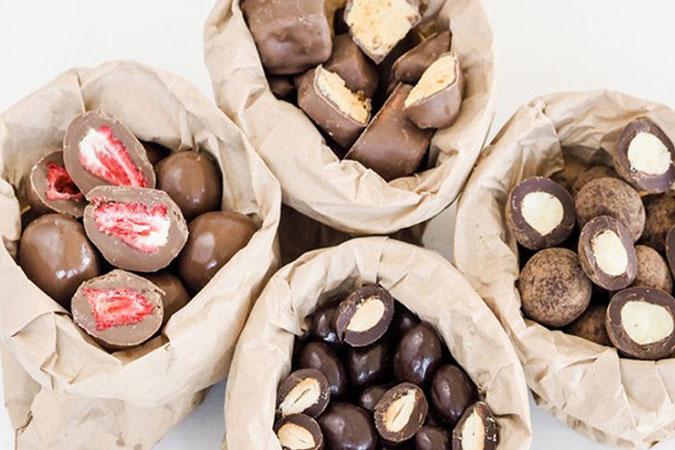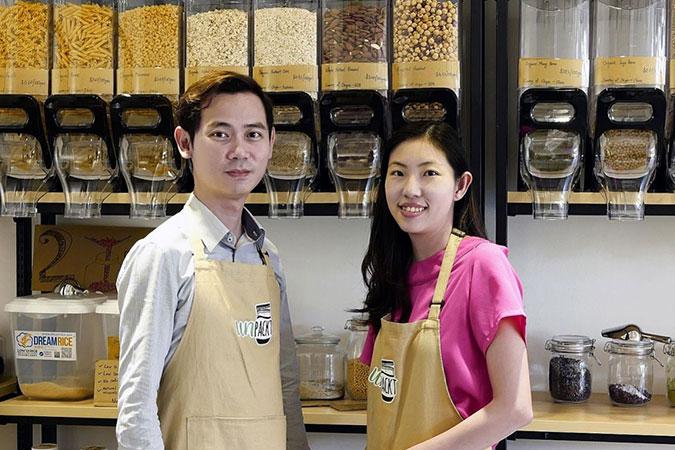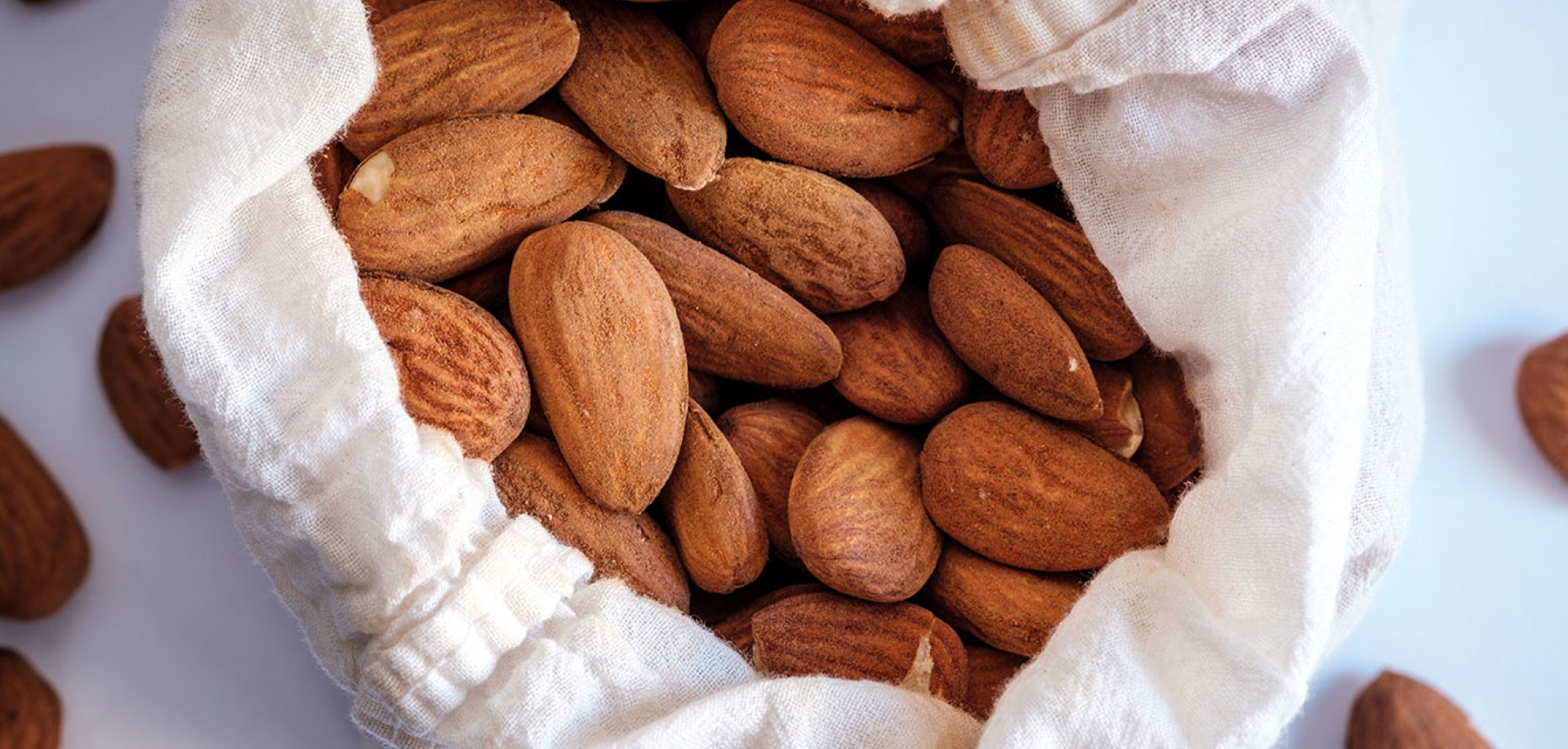Two big Australian bulk food chains are shaking up the zero-waste grocery shopping scene in Singapore.
The Source Bulk Foods, the biggest chain in Australia with more than 50 stores, debuted its 650 sq ft outlet yesterday at Cluny Court. Over at Tanglin Mall, Scoop Wholefoods, which has six outlets in Australia, launched its first 4,400 sq ft outlet in May.
Previously, the players were mainly local business owners who started championing a zero-waste, plastic-free lifestyle beginning last year. They include Reprovisions at Jurong Point; UnPackt in Sembawang Hills and Downtown Gallery; and Eco.Le in Bukit Timah.

Chocolate-covered freeze-dried strawberries, nuts and honeycomb from Australian chain The Source Bulk Foods, which opened its first store in Singapore yesterday. PHOTO: THE SOURCE BULK FOODS
At these eco-friendly stores, one can get a variety of snacks, such as nuts and chocolates, along with dried goods such as pasta, herbs and rice. Scoop Wholefoods and The Source Bulk Foods also allow consumers to churn their own nut butter and buy kombucha on tap.
Nothing comes prepacked in plastic. Get a paper bag or glass jar - or bring your own - fill it with your item of choice and write down the item code for payment according to weight. Non-food products include detergent and soap, as well as lunch boxes and reusable cups and straws.
Ms Emily Kirk, 26, whose parents founded Scoop Wholefoods in 2013, says: "We are disrupting the market and giving it a healthy shake. Perhaps the supermarkets here can emulate us and use less plastic. In Australia, everyone is aware of it. If you notice someone with a plastic bag, it is embarrassing for the person.
"It's not just about plastic, but also encouraging people to reduce waste. If you are cooking for one and all you need is half a cup of rice, then what do you do with the rest? We have seen people coming with recipes and measuring spoons so they take only what they need."
The Tanglin Mall store is Scoop Wholefoods' first outside Australia and it is opening next in Britain on Thursday. There are also plans for further expansion in Singapore and Asia, adds Ms Sajni Gill, 60, chief operating officer of lifestyle group Gill Capital, which brought in Scoop Wholefoods.
WHEN SHOPPING AT A BULK FOOD STORE
-
Prepare a shopping list or have recipes on hand so you measure out only what you need.
-
Bring your own containers to fill up or buy bags and jars from the store and refill them on subsequent visits.
-
Request a product sample instead of helping yourself from the containers to help maintain hygiene standards.
-
Besides checking out the food section, look out for all-natural products such as soap.
-
Ask staff for advice on how best to consume ingredients that may not be common in Singapore. They can also share cooking tips as well as give advice to those with allergies or dietary concerns.
The Source Bulk Foods already has plans for its flagship outlet at Great World City by the end of this year, followed by a third outlet in the Central Business District early next year.
Mr Rob Behennah, 52, The Source Bulk Foods' British master franchiser for South-east Asia, notes that the plastic-free lifestyle has taken root in Singapore.
The Singapore permanent resident says: "People are becoming more aware, environmentally conscious and recognising the importance of sustainable living. Increasingly, there is information being shared and consumers are becoming less daunted by the idea of aspiring towards a zero-waste lifestyle.
"If there is a nationwide initiative to minimise the availability of single-use plastics, such as through restricting the use of plastic bags, straws and cutlery, we know it will lead consumers and retailers alike to further adopt zero-waste shopping."
Local players are not surprised that these big names are here and hope this will create more awareness among consumers.
Mr Allann Tay, 38, co-founder of Reprovisions, says: "Big bulk food brands opening in Singapore is quite a natural occurrence in the retail scene. They definitely help to pique people's interest."
But he is also wary of brands expanding too quickly.
He says: "The rate at which people are mentally ready to embrace such lifestyle changes needs to be in tandem with the rate of such openings for businesses to be sustainable. More innovation is required as many, if not most, items in the supermarkets still use plastic packaging or plastic as a core material."
And while the concept is gaining traction in the heartland, Mr Tay still faces challenges.
He says: "We get questions such as 'Why do I need to buy in this unpackaged manner?' and 'Is it cheaper than in supermarkets?' Some people shop in a more budget-conscious manner as opposed to being concerned about the state of the world."
Aside from educating consumers, businesses are also constantly sourcing new products.
For example, Ms Florence Tay, 37, founder of social enterprise UnPackt, recently launched reusable facial cotton pads to reduce the use of single-use ones.

Founders Jeff Lam and Florence Tay of local social enterprise UnPackt. PHOTO: UNPACKT
She says: "To start an eco-friendly journey doesn't cost an arm or a leg - it can be as simple as saying no to a single-use disposable you don't need or reducing your carbon footprint by supporting local makers. It also sends the message to businesses that local consumers are prepared to go plastic-free."
Ms Tricia Leong, 35, who works in the real estate sector, says: "My friends and I already have our own metal drinking straws and cutlery, along with reusable shopping bags and cups.
"The next step for us is to buy our groceries at bulk food stores like Scoop Wholefoods. I like that I will no longer have a bag of rice or flour sitting in the kitchen when I would usually require only a small portion for just me and my husband."
This article is produced in partnership with ST Life.
